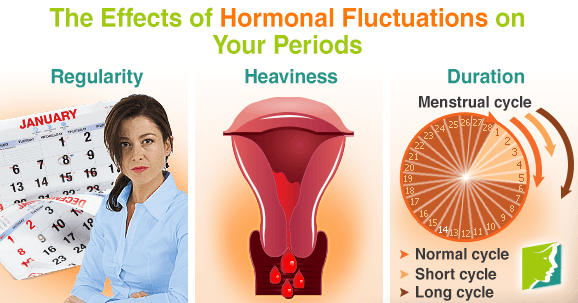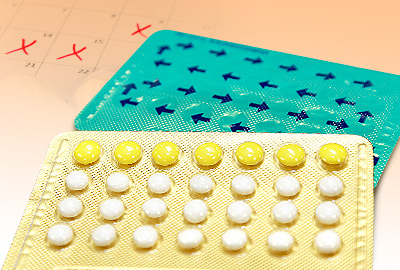The menstrual cycle is primarily dictated by hormones. While menstruation can be affected by diet and other lifestyle factors, your estrogen and progesterone levels play a key role in determining the regularity, duration, and heaviness of your periods. It is inevitable during perimenopause - when these hormones become imbalanced - your menstrual cycle may not be as predictable as you may have been used to in previous years. The hormonal fluctuations you are likely to experience during your forties and early fifties may have a number of effects on your periods.
Regularity
For most of a woman's reproductive life, the menstrual cycle will take place over approximately 28 days, and two to five of these days are comprised of bleeding known as a period. This cycle is dictated primarily by the sex hormones estrogen and progesterone. Estrogen causes the uterus wall lining to thicken, and progesterone triggers the release of an egg. A relatively small drop in both hormones then triggers the shedding of the lining via menstruation.
During perimenopause, the body's hormone production fluctuates as it prepares for menstruation stopping altogether. Decreased estrogen and progesterone levels mean the thickening of the uterus wall occurs erratically, and the shedding of this lining is not triggered on a regular basis. This means that periods occur irregularly, with a matter of months often passing between bleeding. As perimenopause goes on, your periods will most likely continue to decrease in regularity, and once a period has not occurred for a year, menopause has taken place.
Heaviness
When long periods of time pass between menstrual bleeding, a buildup of thickness in the uterus wall lining can occur. This means that when periods do occur, bleeding is likely to be heavy and come with painful cramping as the uterus contracts to shed its lining. It is also common for clotting to occur during heavy periods when the body's anti-coagulants are unable to work at a fast enough rate to prevent clots from emerging in the menstrual blood.
Duration
While regular periods last between two and five days, the effects of hormonal fluctuations mean the duration of periods is not so formulaic during perimenopause. Bleeding may only last one day or it may continue for up to a week. If a period lasts for longer than a week or you notice spotting between menstrual bleeding, it is advisable to consult with your doctor to rule out any health concerns.
Often, heavy, irregular periods are one of the earliest menopause symptoms a woman notices, and they are certainly among the most common. Menstrual irregularities are likely to last for up to ten years (i.e., through the entirety of your forties) and may become increasingly sporadic and uncomfortable in this time, so it is worth learning ways of dealing with them. The effects of irregular periods can be combatted via a series of lifestyle and dietary adjustments, meaning that while the symptom may be a long-term one, it is not unmanageable.
Sources
- National Health Service UK. (2013). Periods, irregular - causes. Retrieved April 30, 2014, from http://www.nhs.uk/Conditions/Periods-irregular/Pages/Causes.aspx
- National Health Service UK. (2013). Periods, irregular - Treatment. Retrieved April 30, 2014, from http://www.nhs.uk/Conditions/Periods-irregular/Pages/Treatment.aspx
- National Health Service UK. (2013). Premenstrual syndrome (PMS). Retrieved April 30, 2014, from http://www.nhs.uk/conditions/premenstrual-syndrome/Pages/Introduction.aspx
- National Institutes of Health. (2014). Menstruation. Retrieved April 30, 2014, from http://www.nlm.nih.gov/medlineplus/menstruation.html
- National Institutes of Health. (2011). Vaginal bleeding: MedlinePlus Medical Encyclopedia. Retrieved April 30, 2014, from http://www.nlm.nih.gov/medlineplus/ency/article/007496.htm
- The Ohio State University. (n.d.). Perimenopause. Retrieved April 30, 2014, from http://medicalcenter.osu.edu/patientcare/healthcare_services/womens_health/menopause/perimenopause/Pages/index.aspx




